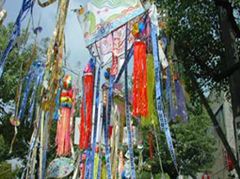在夏天造访日本,你将有机会看到许多令人兴奋的庆典。7月7日这天的“七夕节”就是最受欢迎的庆典之一。这是人们庆祝牛郎织女的浪漫传说的日子。
这个节日在八世纪的时候从中国传到日本。在日本,其实有两个七夕节,根据阳历和阴历而分别在不同的日子。虽然这个节日开始于中国,但日本人庆祝的方式和中国人不同。
其中一个日本传统是,人们会把他们的愿望写在细长的彩色纸条上。然后他们在七夕的夜晚将纸条绑在竹枝上。人们把竹枝挂到房子的外面,希望愿望能实现。
词汇小补帖:
●cowherd牛郎
●lunar calendar阴历
●weaver girl织女
●bamboo branch竹枝
●solar calendar阳历
Sentence 4U 语音讲解:
(点击右键“另存为”可下载语音)
come true "实现",例如:
I'm saving my money, so my dream of traveling to Europe will come true.
我正在存钱,以实现我到欧洲旅游的梦想。
英语小教室
仰望夏夜星空,在银河(the Milky Way)的两边可看到明亮的牛郎星(Altair)和织女星(Vega)。传说中,牛郎织女一年只能在七夕相会一次。七夕节在唐朝时由中国传到日本,《万叶集》中,歌咏七夕节的诗歌就有一百多首。19世纪安藤广重的画作《名胜江户百景》就有描绘江户(现在的东京)地区在七夕节时家家户户摆饰竹子的情景。日本自从明治时代(1868-1910)改用阳历(solar calendar)后,原本在阴历(lunar calendar)七月七的七夕就改在阳历的七月七日了。不过有些地方仍在阴历的七月七过七夕节,因此在日本就形成了拥有"两个七夕"的特殊景象。
英语练功房
happen是不及物动词,没有被动语态。主要有“发生”(以事情或it当主语)和“碰巧”(以人当主语)两种解释。例如:
A severe train accident happened two months ago.
两个月前发生了一起重大的火车事故。
Something strange happened to me yesterday.
昨天我碰到了一件奇怪的事。
I happened to meet an old friend on the subway.
我在地铁里碰巧遇见了一位老朋友。
练习:
1.可能会有什么事发生吗?
2.我们正谈论他的时候,他刚好走进来。
英语练功房_答案:
1.Is anything likely to happen?
2.He happened to come in while we were talking about him.
听力小试 语音播放:
(点击右键“另存为”可下载语音)
1. Why are there two Star Festivals in Japan?
(A)Because the Festival went from China to Japan.
(B)Because it is an old Chinese tradition.
(C)Because of the solar and lunar calendars.
(D)Because the cowherd’s wish came true.
2.M: Didn’t the Tanabata Festival come from China?
W: Yeah, but the Japanese celebrate it differently.
Q: What does the woman mean?
(A)The Japanese celebrate the Tanabata Festival like the Chinese.
(B)The Chinese and Japanese do not celebrate the Tanabata Festival in the same way.
(C)The Tanabata Festival comes from Japan.
(D)The Tanabata Festival happens on July 7.
听力小测验_答案:
1.C 2.B
| ![]() 本网站由北京信息港提供网络支持
本网站由北京信息港提供网络支持
